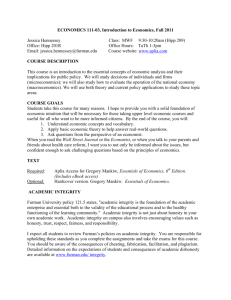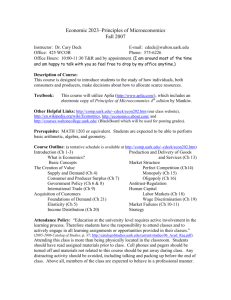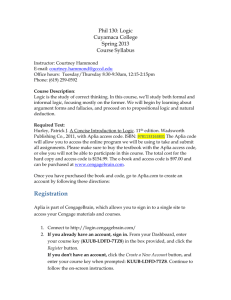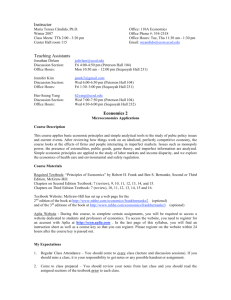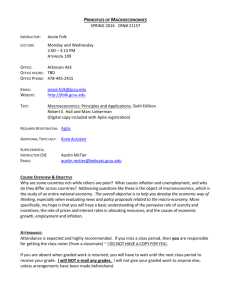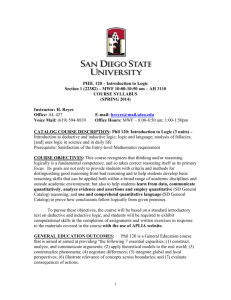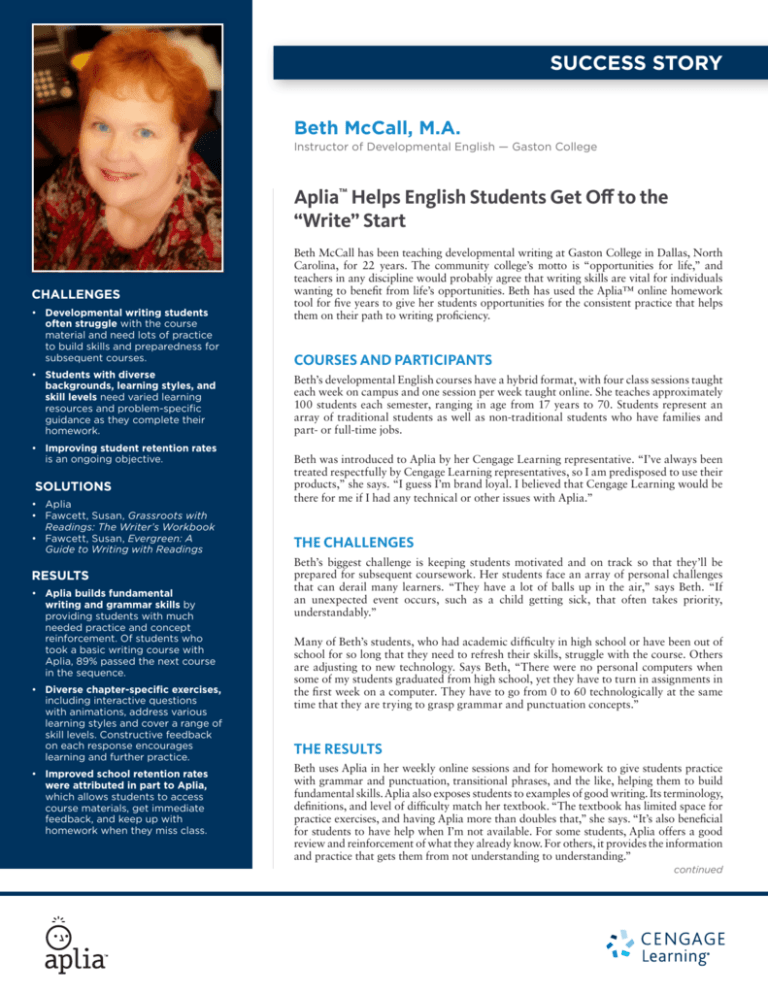
success story
Beth McCall, M.A.
Instructor of Developmental English — Gaston College
Aplia™ Helps English Students Get Off to the
“Write” Start
Challenges
• Developmental writing students
often struggle with the course
material and need lots of practice
to build skills and preparedness for
subsequent courses.
• Students with diverse
backgrounds, learning styles, and
skill levels need varied learning
resources and problem-specific
guidance as they complete their
homework.
• Improving student retention rates
is an ongoing objective.
Solutions
• Aplia
• Fawcett, Susan, Grassroots with
Readings: The Writer’s Workbook
• Fawcett, Susan, Evergreen: A
Guide to Writing with Readings
results
• Aplia builds fundamental
writing and grammar skills by
providing students with much
needed practice and concept
reinforcement. Of students who
took a basic writing course with
Aplia, 89% passed the next course
in the sequence.
• Diverse chapter-specific exercises,
including interactive questions
with animations, address various
learning styles and cover a range of
skill levels. Constructive feedback
on each response encourages
learning and further practice.
• Improved school retention rates
were attributed in part to Aplia,
which allows students to access
course materials, get immediate
feedback, and keep up with
homework when they miss class.
Beth McCall has been teaching developmental writing at Gaston College in Dallas, North
Carolina, for 22 years. The community college’s motto is “opportunities for life,” and
teachers in any discipline would probably agree that writing skills are vital for individuals
wanting to benefit from life’s opportunities. Beth has used the Aplia™ online homework
tool for five years to give her students opportunities for the consistent practice that helps
them on their path to writing proficiency.
COURSES AND PARTICIPANTS
Beth’s developmental English courses have a hybrid format, with four class sessions taught
each week on campus and one session per week taught online. She teaches approximately
100 students each semester, ranging in age from 17 years to 70. Students represent an
array of traditional students as well as non-traditional students who have families and
part- or full-time jobs.
Beth was introduced to Aplia by her Cengage Learning representative. “I’ve always been
treated respectfully by Cengage Learning representatives, so I am predisposed to use their
products,” she says. “I guess I’m brand loyal. I believed that Cengage Learning would be
there for me if I had any technical or other issues with Aplia.”
THE CHALLENGES
Beth’s biggest challenge is keeping students motivated and on track so that they’ll be
prepared for subsequent coursework. Her students face an array of personal challenges
that can derail many learners. “They have a lot of balls up in the air,” says Beth. “If
an unexpected event occurs, such as a child getting sick, that often takes priority,
understandably.”
Many of Beth’s students, who had academic difficulty in high school or have been out of
school for so long that they need to refresh their skills, struggle with the course. Others
are adjusting to new technology. Says Beth, “There were no personal computers when
some of my students graduated from high school, yet they have to turn in assignments in
the first week on a computer. They have to go from 0 to 60 technologically at the same
time that they are trying to grasp grammar and punctuation concepts.”
The Results
Beth uses Aplia in her weekly online sessions and for homework to give students practice
with grammar and punctuation, transitional phrases, and the like, helping them to build
fundamental skills. Aplia also exposes students to examples of good writing. Its terminology,
definitions, and level of difficulty match her textbook. “The textbook has limited space for
practice exercises, and having Aplia more than doubles that,” she says. “It’s also beneficial
for students to have help when I’m not available. For some students, Aplia offers a good
review and reinforcement of what they already know. For others, it provides the information
and practice that gets them from not understanding to understanding.”
continued
continued from page 1
“Of the students
who pass my
course, 89% of
them pass the
next course
in the writing
sequence on
the first go
around....I think
Aplia plays a role
in that success.”
Beth McCall
Instructor of Developmental
English,
Gaston College
Aplia course management tools help Beth stay in touch with her class; Aplia also allows her to
upload additional course materials for easy access by students. “Without Aplia, I would be hard
pressed to find the time to create exercises, post them on BlackBoard® (the school’s learning
management system), and grade them.”
Beth’s favorite Aplia feature is the instant response that it provides to students. “When they
submit their answers, they get constructive feedback. For incorrect answers, a prompt tells them
where in the chapter they need to review.” Succinct instruction and a diversity of chapter-specific
exercises (each with different variations) address various learning styles and cover a range of
skill levels. For instance, some problems include interactive animations that allow students to
“see” how grammar works. Aplia also has a diagnostic assessment tool that enables instructors
to evaluate where they should focus their teaching efforts.
“One of our course outcomes is to include a technology component. With Aplia, I know that I
am giving my students up-to-date technology and preparing them for their other courses and the
work world,” says Beth. Aplia is also advantageous for busy students who can’t always make
it to class. “I can post my lecture notes and course materials, and they can see their homework
online so they don’t fall behind.” As students complete assignments, grades are posted in the
Aplia gradebook, a tool with various reporting features that allow instructors to monitor
performance for individual students and for the class as a whole.
Gaston’s retention rates have improved, and Beth believes that Aplia plays a role. “Our higher
retention rates are due to a combination of factors, but it makes sense that if students who miss
a class have Aplia, they don’t fall behind on homework, they don’t get discouraged, and they
stay in the course.”
With respect to student performance and Aplia, Beth says, “Of the students who pass my
course, 89% of them pass the next course in the writing sequence on the first go around — so
I can say that students leave my class adequately prepared. I think Aplia plays a role in that
success,because it helps students establish the grammatical and punctuation foundation that
they need to succeed later on.”
Beth is also a fan of Cengage Learning Digital Course Support Services. “I am a technodinosaur, and my Digital Solutions Coordinators helps me all the time. I have had nothing
but good experiences with Cengage Learning staff. Any English teacher who needs or wants a
technological component should look at Aplia.”
Gaston College
Dallas, North Carolina
To learn more about
this and other digital
solutions provided by
Cengage Learning, visit:
www.cengage.com/
DiscoverDigital
Source Code: 13L-AG0657
Cengage Learning is a leading provider of innovative teaching, learning, and research solutions
for academic, professional, and library markets worldwide. The company’s products and services
are designed to foster academic excellence and professional development, increase engagement,
improve learning outcomes, and deliver authoritative information to people whenever and wherever
they need it. Through the company’s unique position within both the library and academic markets,
Cengage Learning is providing integrated learning solutions that bridge from the library to the
classroom. www.cengage.com
Copyright ©2013 Cengage Learning. All Rights Reserved.




